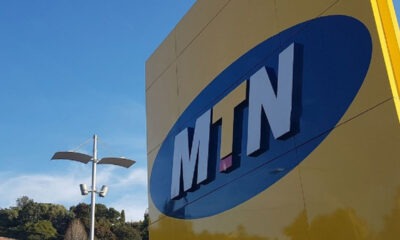MTN Nigeria Communications Plc (MTN Nigeria) total subscribers declined by 5 million from 76.5 million recorded at the end of the final quarter of 2020 to N71.5 million in the quarter ended 31 March 2021.
The leading telecommunications giant stated in its unaudited financial statements released for the first quarter (Q1) 2021.
Active data users also declined by 71,000 to 32.5 million during the same quarter.
MTN blames the decline on a series of regulatory restrictions on new SIM sales and activations.
However, MTN service revenue increased by 17.2 percent to N385.2 billion. See key highlights below.
MTN Nigeria Key Financial Highlights for Q1 2021
• Mobile subscribers declined by 5 million to 71.5 million due to the effects of customer churn and the regulatory restrictions on new SIM sales and activations
• Active data users declined marginally by 71,000 to 32.5 million
• Service revenue increased by 17.2% to N385.2 billion
• Earnings before interest, tax, depreciation, and amortisation (EBITDA) grew by 19.1% to N204.5 billion
• EBITDA margin increased by 0.9 percentage points (pp) to 53.1%
• Capital expenditure was up by 19.3% to N89.9 billion (up 27.8% to N31.6 billion excluding right of use [RoU] assets)
• Profit before tax grew by 33.9% to N102.9 billion
• Earnings per share rose by 42.5% to N3.60 kobo
Commenting on the performance, Karl Toriola, MTN Nigeria CEO, said “We made good progress in the first quarter of 2021 despite the continued impact of the COVID-19 pandemic. We continue to prioritise the safeguards put in place to protect the health and well-being of our people, customers and stakeholders and to control the spread of the virus while ensuring network resilience and efficiency.
“As part of our Y’ello Hope initiatives, we continue to support Government’s efforts in combatting the COVID-19 pandemic. We supported the most vulnerable in our communities, providing them with free-to-access services (including SMS and data) as well as essential medical supplies (tests and personal protective equipment).
“We continue to support the Coalition Against COVID-19 (CACOVID) that has driven multiple initiatives, such as building isolation centres across the country. MTN Nigeria also paid taxes early in support of Government’s ongoing efforts. In addition, our REVV support programme for Micro, Small and Medium Enterprises (MSME) helps them navigate the new digital reality.”
“Operationally, service revenue in Q1 grew by 17.2% YoY, in line with our medium-term target, supported by growth of 42.6% and 8.0% in data and voice revenue respectively. This was achieved despite the impact of the pandemic and a decline in our subscriber base due to the effects of customer churn and the restrictions on new SIM sales and activations arising from changes in SIM registration regulations. We continue to collaborate with the Nigerian Communications Commission (NCC) and the Nigerian Identity Management Commission (NIMC) to update subscriber records with the National Identity Number (NIN).”
“Thus far, more than 35 million subscribers have submitted their NINs as at 30 April 2021, representing approximately 50% of our subscriber base and 63% of service revenue. We are also actively supporting the Government’s NIN enrolment programme, with 182 points of enrolment active across the country. We are working with NIMC to increase the enrolment centres to provide an access point for as many Nigerian as possible.
“Impacted by the reduction in the overall subscriber base in Q1, active data subscribers declined marginally by 71,000 to 32.5 million. However, we recorded an 86.7% increase in data traffic and a 48.5% increase in usage (MB per user) from the existing base. The improvement in data services was supported by the completion of our acquisition and activation of an additional 800MHz spectrum, enabling us to further increase traffic by 10% and enhance throughput by 79%.”
“Digital revenue grew by 101.0% and fintech revenue by 28.5% as customers continued to adopt more digital products and services, a trend accelerated by the pandemic. As at the end of March 2021, we had 449,100 registered MoMo agents and 4.6 million fintech customers.”
“Our ability to drive service revenue growth while managing the growth in expenses resulted in an acceleration in EBITDA growth to 19.1% and EBITDA margin expansion of 0.9pp to 53.1% YoY. This enabled profit before tax (PBT) and profit after tax (PAT) growth of 33.9% and 42.5% respectively.”


 Forex2 weeks ago
Forex2 weeks ago


 Naira1 week ago
Naira1 week ago
 Naira4 weeks ago
Naira4 weeks ago
 Company News4 weeks ago
Company News4 weeks ago




 Naira2 weeks ago
Naira2 weeks ago
 Billionaire Watch1 week ago
Billionaire Watch1 week ago




 Naira3 weeks ago
Naira3 weeks ago




 Naira1 week ago
Naira1 week ago















